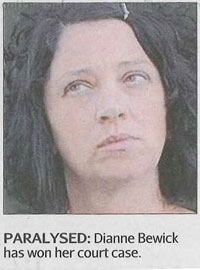Monday, 23 September 2013
Tourist Wins Rights to Payout Over SA Paragliding Disaster
Leila Samodien– Leila.samodien@inl.co.za
What started off as a “bit of a walk on the wild side” ended in a paragliding crash paraplegia and a court battle for a British tourist, who has now won the right to damages.
A holiday in Cape Town led Diane Bewick 44 of Middlesborough to Hermanus on April 12, 2004 for tandem paragliding.
But her fateful flight was short-lived. Just after take- off she and the experienced paraglider with whom she was flying hit a cliff, breaking her legs and leaving her permanently paralysed from the waist down.
Bewick’scase hinged on the contention that tandem paragliding for reward was illegal. She had not known this.
In a Western Cape High Court judgment delivered on Friday Judge Pat Gamble found that the Civil Aviation Authority ( CAA) and the South African Hang and Paragliding Association were jointly liable for Bewick’s damages.
While Bewick is attempting to claim £1.45 million (R22.96m) the amount she is to be awarded has yet to be decided.
Judge Gamble found that at the time of the accident tandem paragliding for commercial gain was illegal. He came to the conclusion that in this case one had to adopt a “common sense approach” and ask the following question: had the association and the CAA done what they should with regard to the prevalence of tandem paragliding for reward, would Bewick have flown with paraglider Robert de Villiers- Roux that day?
“The answer must be an unequivocal no,” he found.
Bewick’s legal team the judgment read, had argued that even now the practice remained illegal where a proper exemption had not been granted under the Air Services Act.
Judge Gamble did not make a clear pronouncement on this point. However, he found the law did not enable the CAA commissioner to grant exemptions to commercial operators.
He said the evidence before the court showed that the CAA had been aware as far back as 1998 that commercial tandem paragliding was rife and of the potential danger it posed to passengers.
Apart from warnings it issued from time to time, no positive steps had been taken to put an end to the practice.
“In my view, the legal convictions of the community in which we live demand that the failure by the CAA to take such reasonable steps to prevent the occurrence of an illegal activity such as commercial tandem paragliding of which it was manifestly aware and which illegal activity could and ultimately did, result in serious injury to an unsuspecting member of the public, should be considered to be unlawful ”wrote Judge Gamble.
He found the association had “failed hopelessly” to discharge its duty of care to Bewick.
Bewick was “delighted”, her attorney Tzvi Brivik, said.


Leave A Comment
You must be logged in to post a comment.